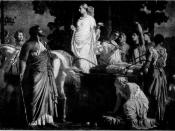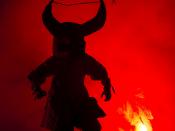The Bow of Odysseus
To quote Crissy, "Book 21 of the Odyssey might be termed 'The Book on the Bow.'" It contains the history of the bow and an account of the contest which marks the beginning of Odysseus' final attack on the suitors. It is by means of the bow that Odysseus disposes with the suitors, retakes control of his household, and fully reclaims his lost identity. But this bow is not only a deadly weapon; it is also a symbolic link both between Odysseus and the bows and the heroes of the Greek mythic past, and between Odysseus and the kleos he would reclaim with it. Odysseus' bow both symbolically secures his rightful place in the pantheon of Greek mythic heroes, and ensures that bards would sing of him in that place for centuries to come.
It's clear that Odysseus' bow is not a weapon of war. First of all, Odysseus chooses not to bring it with him to Troy; rather, he locks it away in his storerooms along with his other most treasured possessions.
Further, the origins of the bow lay not in violence but in friendship; it was a guest-gift given to him at the house of Ortilochos by Iphitos, whom he met while searching for stolen animals on behalf of Laertes, his father. When the bow makes its appearance in the Odyssey, it is not so much a violent weapon as test of strength and skill. The bow contest is not intended to get anyone injured or killed,but merely to provide a means of competition among the suitors (and, of course, an opportunity for Odysseus to dramatically reveal himself to them).
Furthermore, Odysseus' bow seems to have none of the negative connotations the bow carries as a weapon of war In the Iliad. On the...


